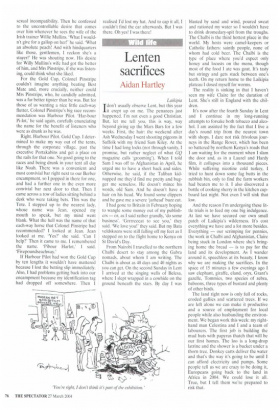Lenten sacrifices
Aidan Hartley
Laikipia
Idon't usually observe Lent, but this year it crept up on me. The penances just happened. I'm not even a good Christian. But, let me tell you, this is way, way beyond giving up the Mars Bars for a few weeks. First, the hair: the weekend after Ash Wednesday I went shooting pigeons in Suffolk with my friend Sam Kiley. At the time I had long locks (not through vanity, I promise, but rather neglect of what GQ magazine calls 'grooming). When I told Sam I was off to Afghanistan in April, he urged me to have a short back and sides. Otherwise, he said, if the Taliban kidnapped me they'd find me pretty and bugger me senseless. He doesn't mince his words, old Sam. And he doesn't have a hair on his head. We found some clippers and he gave me a severe jarhead' buzz cut.
I had gone to Britain in February hoping to wangle some money out of my publishers — or, as I said rather grandly, 'do some business'. `Garreeeat to see you,' they said. 'We love you!' they said. But my Bata veldskoens were still falling off my feet as I stepped on to the flight home to Kenya on St David's Day.
From Nairobi I travelled to the northern Chalbi desert to stay among the Gabra nomads, about whom I am writing. The Chalbi is about as 40 days and 40 nights as you can get. On the second Sunday in Lent I arrived at the singing wells of Belesa, where I slept wrapped in a cowhide on the ground beneath the stars. By day I was blasted by sand and wind, poured sweat and rationed my water so I wouldn't have to drink dromedary-spit from the troughs. The Chalbi is the third hottest place in the world. My hosts were camel-keepers or Catholic fathers: saintly people, none of whom had cold beer. The Chalbi is the type of place where you'd expect only honey and locusts on the menu, though most of the food I ate was goat. It's tasty but stringy and gets stuck between one's teeth. On my return home to the Laikipia plateau I dosed myself for worms.
The reality is sinking in that I haven't seen my wife Claire for the duration of Lent. She's still in England with the children.
It's now after the fourth Sunday in Lent and I continue in my long-running attempts to forsake both tobacco and alcohol. I am assisted by the fact that I live a day's round trip from the nearest town with shops. I dare not risk frivolous journeys in the Range Rover, which has been so battered by northern Kenya's roads that I am waiting for the moment when I slam the door and, as in a Laurel and Hardy film, it collapses into a thousand pieces. While suffering nicotine cold turkey, I tried to hunt down some fag butts in the rubbish bin, only to find the farm workers had beaten me to it. I also discovered a bottle of cooking sherry in the kitchen cupboard last night. Not even I will sink that low.
And the reason I'm undergoing these little trials is to feed my one big indulgence. At last we have secured our own small patch of Laikipia's wilderness. It's cost everything we have and a lot more besides. Everything — our scrimping for pennies, the work in Chalbi and Afghanistan, Claire being stuck in London where she's bringing home the bread — is to pay for the land and its development. As I wander around it, speechless at its beauty, I know why we are making the sacrifices. In the space of 15 minutes a few evenings ago I saw elephant, giraffe, eland, oryx, Grant's gazelle, Tommies, two species of zebra, baboons, three types of bustard and plenty of other birds.
The land right now is only full of rocks, eroded gullies and scattered trees. If we are left alone we can make it productive and a source of employment for local people while also husbanding the environment. We began work this week: my righthand man Celestina and I and a team of labourers. The first job is building the mud huts with papyrus thatch that will be our first homes. The loo is a long-drop latrine and the shower is a bucket under a thorn tree. Donkey carts deliver the water and that's the way it's going to be until I can afford electricity and pumps. Some people tell us we are crazy to be doing it, Europeans going back to the land in Africa in 2004. We could lose it all. True, but I tell them we're prepared to risk that.


























































































 Previous page
Previous page